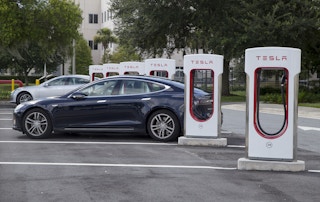As gas prices continue to be squirrely, lots of people have turned to electric vehicles, both for cost savings and to reduce their carbon emissions. There are countless models out there these days, and there are more ways than ever to make electric vehicles more affordable if you know how to shop for them.
There’s been an EV tax credit for electric cars for years, but it’s been modified from time to time, and right now only works on 10 specific cars — unless you take advantage of a loophole. We’ll tell you how to get the tax credit on that electric car you’ve been looking at, as well as the cheapest EV options right now.
You can get an average tax credit of $3,751 for new electric vehicle purchases.

Courtesy of Rivian
According to the IRS, you could get a tax credit of up to $7,500 if you buy a new electric car or hydrogen-powered car. But the rules for this credit have changed for cars bought between 2023 and 2032 because of a law called the Inflation Reduction Act of 2022.
To qualify for the electric vehicle (EV) tax credit, you need to use the vehicle for yourself and not for selling it to others, and should primarily use it in the U.S. There are also income limits to be eligible for this credit:
- If you’re married and file taxes jointly, your income should be below $300,000.
- If you’re the head of a household, your income should be below $225,000.
- For all other filers, the income limit is $150,000.
The minimum tax credit for qualifying EVs and taxpayers is usually $3,751. This is how it breaks down:
- $2,500 base amount
- An additional $417 for a vehicle with at least 7 kilowatt hours of battery capacity
- An additional $417 for each kilowatt hour of battery capacity beyond 5 kilowatt hours
Vehicles that are eligible for a single electric vehicle tax credit of up to $3,751 include:
- Ford E-Transit
- Ford Escape plug-in hybrid
- Ford Mustang Mach-E
- Jeep Wrangler 4xE
- Jeep Grand Cherokee 4xE
- Lincoln Corsair Grand Touring
- Rivian R1S
- Rivian R1T
- Tesla Model 3 Standard Range RWD
Only 10 electric vehicles qualify for the maximum $7,500 EV tax credit.

Picudio | Dreamstime.com
If you want the full EV tax credit of up to $7,500, the government requires that the electric vehicles:
- Be made in North America
- Contain certain percentages of battery parts from the U.S. or approved countries
- Must have a sticker price of $55,000 or less if they’re cars
- Must have a sticker price of $80,000 or less if they’re pickup trucks, SUVs, or vans
So, with that criteria, only the following 10 electric vehicles qualify for the EV tax credit right now:
- Cadillac Lyriq (2023-2024)
- Chevrolet Bolt EUV (2022-2023)
- Chevrolet Bolt EV (2022-2023)
- Chevrolet Suburban EV (2024)
- Ford F-150 Lightning (2022-2023)
- Tesla Model 3 Performance (2022-2023)
- Tesla Model Y AWD/Long Range/Performance (2022-2023)
- Volkswagen ID.4/ID.4S (2023)
- Volkswagen ID.4 Pro/Pro S/Pro S Plus (2023)
- Volkswagen ID.4 AWD Pro/AWD Pro S/AWD Pro S Plus (2023)
Though not yet released at the time of this writing, the Chevrolet Blazer EV (2024) and Chevrolet Equinox EV (2024) will also be eligible for the full $7,500 tax credit.
Related: Is Carvana a Good Deal?
The EV tax credit expands to more cars if you lease your vehicle.
A loophole in the EV tax credit rules means that while only 10 cars are eligible for the EV tax credit if they’re purchased, significantly more vehicles are eligible for the EV tax credit if you lease them. This is because leased vehicles are considered by the IRS to be commercial vehicles, which don’t have as stringent regulations on where they’re manufactured or where their parts are made.
However, there is still a major catch here: The tax credit is dependent on whether your car dealer and lender choose to apply it for you, and it’s basically entirely up to them whether they do so, as well as for how much.
This is why it’s key to understand your contract and to ask questions before signing to make sure they pass those savings onto you.
That said, the previously listed EVs will qualify for the EV tax credit if leased, plus these cars:
- Audi E-Tron
- Audi E-Tron GT
- Audi Q4 E-Tron
- Audi Q5 55 E
- BMW i4 eDrive35
- BMW iX xDrive50
- BMW iX M60
- Chrysler Pacifica Hybrid
- Genesis GV60
- Genesis Electrified GV70
- Genesis Electrified G80
- Hyundai IONIQ 5
- Hyundai Kona Electric
- Hyundai Nexo
- Hyundai Santa Fe
- Hyundai Tucson
- Jaguar I-PACE
- Jeep Grand Cherokee 4xe
- Jeep Wrangler 4xe
- Kia EV6
- Kia Niro EV
- Kia Niro PHEV
- Mercedes-Benz EQB
- Mercedes-Benz EQE Sedan
- Mercedes-Benz EQE SUV
- Mercedes-Benz EQS Sedan
- Mercedes-Benz EQS SUV
- Nissan Ariya
- Porsche Cayenne E-Hybrid
- Porsche Panamera E-Hybrid
- Porsche Taycan
- Subaru Solterra
- Toyota BZ4X
- Toyota Mirai
- Toyota Prius Prime
- Toyota RAV4 Prime
- Volvo C40 Recharge
- Volvo XC40 Recharge
- Volvo XC60 Recharge
- Volvo XC90 Recharge
If you’re still not sure if your vehicle is eligible for an EV tax credit (or just want to double check!), you can talk to your accountant or input your specific vehicle purchase or lease details here.
Related: Car Buying Tips & Tricks to Outsmart the Dealerships
Leasing an electric vehicle with the tax credit will save you money vs. buying it.
Your savings per month for leasing versus buying an EV will vary depending on which EV you choose. The AP reports, “Hyundai is offering to lease an Ioniq 5 SE rear-wheel-drive EV for $499 a month for three years, though the customer must put down nearly $4,000. Buying the same EV would cost $865 a month for five years at the average new-auto loan rate of 7%.”
This means for that specific make and model, you’d save $366 every single month to lease the vehicle instead of buying it.
The cheapest qualifying EV lease is a Chevy Bolt at $299/month.

Courtesy of Chevrolet
Prices for leased EVs vary by dealership, make, model and location. What’s more, eligible returning lessees are more likely to get better deals than new lessees. That said, these are the current lowest-cost manufacturer-sponsored lease deals overall for new lessees:
- 2023 Chevrolet Bolt EV: $299 per month for 36 months with $6,759 due at signing
- 2023 Chevrolet Bolt EUV: $319 per month for 36 months with $6,769 due at signing
- 2023 Hyundai Kona Electric: $269 per month for 36 months with $3,999 due at signing
- 2023 Kia Niro EV: $329 per month for 36 months with $3,999 due at signing
- 2023 Nissan Leaf: $329 per month for 36 months with $2,519 due at signing
Ready to lease? Make sure you know the difference between leasing and buying.

Prostockstudio | Dreamstime
The most important difference to know when you’re deciding whether to lease or to buy a vehicle is that if you lease the vehicle, it’s never actually yours. If you buy a vehicle and finance it, your payments stop once the principal and interest are all paid off. More details about leases that are important to keep in mind:
- You pay monthly to use the vehicle, for a minimum time period (and can’t get out of it sooner).
- There’s a large payment due at signing, typically starting at $2,500.
- Some leases require security deposits.
- No minimum credit score is needed to lease.
- Monthly payments are usually lower than buying, but leasing can end up costing more over time.
- Insurance premiums are often higher, requiring full coverage.
- Leasing doesn’t build equity, unlike purchasing.
- Vehicle depreciation limits the importance of equity for many drivers.
- Mileage restrictions apply, with high fees for exceeding the limit. (The mileage limit for most leased vehicles is typically within the 12,000 to 15,000 range.)
- Breaking a lease can result in significant fees.
- Wear and tear on the vehicle can be costly at the end of the lease. Even minor cosmetic damage can cost you big time.
- Manufacturer warranty may cover repairs during the lease period.
- You can return, renew, buy, or trade the vehicle at the end of the lease.
- Buying your leased vehicle incurs extra fees.
Download the KCL app to add and redeem coupons in store






















































